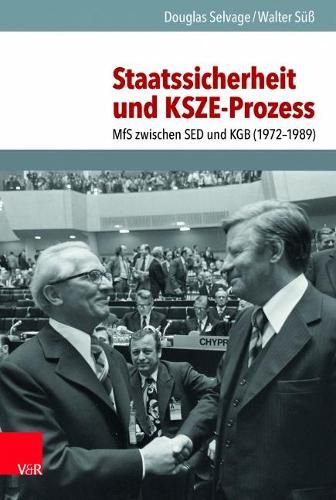Readings Newsletter
Become a Readings Member to make your shopping experience even easier.
Sign in or sign up for free!
You’re not far away from qualifying for FREE standard shipping within Australia
You’ve qualified for FREE standard shipping within Australia
The cart is loading…






The book analyzes the role, activities and influence of the East German Ministry of State Security (MfS or Stasi) not only in connection with the Conference for Security and Cooperation in Europe (CSCE) and its follow-up conferences (i. e., the CSCE Process ), but also in terms of limiting its influence upon East German society in terms of improved human rights and increased human contacts between East and West. On the one hand, the MfS supported the hard line of the East German party and state leadership in the CSCE process - also, when necessary, in opposition to the Soviet Union. On the other hand, the MfS supported Moscow’s demands - also communicated by its fraternal organ , the KGB - that the East German leadership should conduct a policy of strict delimitation (Abgrenzung) with regard to West Germany in order to seal Germany’s division. In general, Minister of State Security Erich Mielke supported the hardest possible line toward West Germany, whether as a representative of the East German Party leadership with regard to Moscow or as a supporter of Moscow’s hard line for the GDR towards West Germany within the SED regime. However, the economic weakness of the GDR and the Soviet Union, further exacerbated by the arms race with NATO and especially the U.S. in the 1980’s, led to concessions by both regimes to the West both within and outside of the CSCE process that further limited the possibilities of the MfS in terms of repressing East German dissidents. More importantly, this was also the case with regard to the growing movement to emigrate from the GDR to West Germany that had developed in response to the GDR’s signing of the CSCE Final Act in Helsinki in August 1975. In the end, the Stasi, which had always been a servant of two masters - i. e. the East German Party and the Soviet Union, represented by the KGB - could no longer keep the domestic effects arising from the CSCE process and detente under control because of the concessions of its two erstwhile masters to the West.
$9.00 standard shipping within Australia
FREE standard shipping within Australia for orders over $100.00
Express & International shipping calculated at checkout
The book analyzes the role, activities and influence of the East German Ministry of State Security (MfS or Stasi) not only in connection with the Conference for Security and Cooperation in Europe (CSCE) and its follow-up conferences (i. e., the CSCE Process ), but also in terms of limiting its influence upon East German society in terms of improved human rights and increased human contacts between East and West. On the one hand, the MfS supported the hard line of the East German party and state leadership in the CSCE process - also, when necessary, in opposition to the Soviet Union. On the other hand, the MfS supported Moscow’s demands - also communicated by its fraternal organ , the KGB - that the East German leadership should conduct a policy of strict delimitation (Abgrenzung) with regard to West Germany in order to seal Germany’s division. In general, Minister of State Security Erich Mielke supported the hardest possible line toward West Germany, whether as a representative of the East German Party leadership with regard to Moscow or as a supporter of Moscow’s hard line for the GDR towards West Germany within the SED regime. However, the economic weakness of the GDR and the Soviet Union, further exacerbated by the arms race with NATO and especially the U.S. in the 1980’s, led to concessions by both regimes to the West both within and outside of the CSCE process that further limited the possibilities of the MfS in terms of repressing East German dissidents. More importantly, this was also the case with regard to the growing movement to emigrate from the GDR to West Germany that had developed in response to the GDR’s signing of the CSCE Final Act in Helsinki in August 1975. In the end, the Stasi, which had always been a servant of two masters - i. e. the East German Party and the Soviet Union, represented by the KGB - could no longer keep the domestic effects arising from the CSCE process and detente under control because of the concessions of its two erstwhile masters to the West.